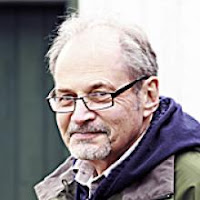Henry Schellenberg
Locus iste a Deo factus est,
inaestimabile sacramentum,
irreprehensibilis est.
This place was made by God,
a priceless sacrament;
it is without reproach.
This text, set to music by Anton Bruckner in the 19th century for the dedication of a German cathedral is forever associated, in my mind, with the memory of Dr. Henry Schellenberg. I met Henry in 2010 when I auditioned to sing in the Providence University Chamber Choir. One of the first songs we learned was "Locus Iste" - a choir favourite that we would sing regularly for the rest of the time I was with the group.
 I love this text. It is simple, short, and elegant. I even scrawled the Latin text on the foundation of the new building that my church constructed around the end of 2014. The text names an irreducible truth about the goodness of materiality and the importance of discrete places in our lives as embodied humans and the varied relationships we have in these discrete places with God. Yet in order to avoid reducing this song to its text alone, allow me to suggest that it is the music that Bruckner set it to, and that Henry drew out from us that made this song truly special.
I love this text. It is simple, short, and elegant. I even scrawled the Latin text on the foundation of the new building that my church constructed around the end of 2014. The text names an irreducible truth about the goodness of materiality and the importance of discrete places in our lives as embodied humans and the varied relationships we have in these discrete places with God. Yet in order to avoid reducing this song to its text alone, allow me to suggest that it is the music that Bruckner set it to, and that Henry drew out from us that made this song truly special.
The choir enters all together, the melodies being pushed along by prompts from the bass section and soaring off toward heaven with the delicate decorations of the sopranos. A hushed reverence characterizes the piece, yet the sound inexorably fills the room, elevating and sanctifying the ordinary bodies and materials that participate in the amplification of the resonance of the piece.
As a song written to consecrate cathedrals, the piece performed best in those old churches that were built for choirs. The height and breadth of the sound filled the gothic space of English churches in a way that sent chills down my spine. Yet it was also a song for ordinary and unusual places. We sang it in a tunnel under a wall at a castle in St. Andrews - a spot that had seen the bloody death of many men as they fought desperately to keep out invaders in the smokey darkness so many centuries ago. We sang it at the simple (and acoustically lacking) Mennonite church-hall where two of our choristers, Candace and Colin, were married. We even sang it in the university gymnasium, a space designed to swallow sound if ever there was one. And yet, even in these places, the song took on a special life as the bodies of the choristers became the places of resonance wherein sound becomes music.
Singing this song under Henry's direction pointed me toward a reality that I would not understand for many more years. The singing of "Locus Iste" is a celebration of well made churches, to be sure, but it is more than that. This song turns its singers to the deeper reality that our bodies are always already in places that are made by God, priceless sacraments, beyond reproach. When we sang "Locus Iste" Henry's body, a body that was in pain from old injuries and slowly falling prey to the ravages of cancer, became a body of graceful serenity as he moved and conducted us in such a way that beautiful harmonies could be drawn from the faltering throats of relatively untrained kids. Henry took a group of people who were of uncertain choral ability and, for a few brief moments, enabled our bodies to become the locus of truthful worship.
Henry died shortly after our trip to the UK. He had been a choir director for almost 30 years. I have yet to meet somebody who sang under Henry who was not profoundly transformed by the experience. Perhaps that's because, in Henry's gentle way, we had been invited into a reality in which we discovered that our ordinary bodies, and our ordinary lives, are the places that have been made by God to be priceless sacraments that are beyond reproach.
Comments
Post a Comment